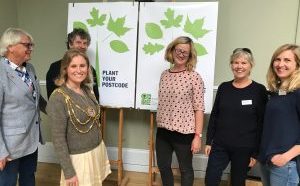'The PM’s "new deal" makes a mockery of the government’s so-called green recovery'

CPRE, the countryside charity, has given a decidedly hostile response to the prime minister’s post-coronavirus recovery plan in which he promised to “build, build, build”.
Boris Johnson’s announcement of a ‘new deal’, delivered in Dudley yesterday (Tuesday, June 30), pledged £5 billion to build homes and infrastructure and vowed to speed up and intensify plans set out in the Tory election manifesto.
The UK economy has reportedly shrunk faster between January and March this year than at any time since 1979 and the government proposals are intended to halt that decline.
Key features of Johnson’s ‘new deal’, some of which had already been announced, include:
- £100 million for 29 road projects
- £12 billion to help build 180,000 new affordable homes for ownership and rent over the next eight years
- £1.5 billion for hospitals, the removal of mental-health dormitories and improving A&E capacity
- More than £1 billion for new school buildings
Tom Fyans, campaigns and policy director at CPRE, made a blistering attack on the prime minister’s scheme:
“With road-building at its heart, the PM’s ‘new deal’ makes a mockery of the government’s so-called green recovery.
“At this historic moment, the government must show real ambition and build back better, not worse, and in doing so balance our health and well-being, nature and countryside and the economic recovery.
“The government cannot continue to ignore the surge in appreciation for green spaces and the public appetite to reduce our carbon emissions.
“We must not even begin down this path with plans for £27 billion spending on roads. That money could be much better spent connecting towns and villages with low-carbon public transport, shoring up rural economies and businesses hard hit by the coronavirus and investing in genuinely affordable and well-designed housing.
“Furthermore, the PM has pledged to ‘build at the pace that this moment requires’, which strikes fear in the hearts of those who understand the benefits of a plan-led system.
“Rushing through potentially poor-quality development is the very antithesis of building back better. We already know, from painful experience, a rush for development trades off quality homes and infrastructure for quick and easy economic growth.
“This trade-off isn’t necessary. It’s already far too easy to build poor-quality homes and therefore any plans to deregulate our democratic, locally accountable planning system will take decision-making powers from communities and local councils and hand it to short-sighted developers.
“The government can only seriously claim to be pursuing the levelling-up agenda after scrapping planned spend on roads and refocusing planning reforms to deliver for people rather than developers.
“Until then, it’s the same old deal.”
Wednesday, July 1, 2020
- A number of important documents have yet to emerge. For example, a rigorous transport plan and a finalised air-quality assessment. The latter is critical given that allocations at Teynham will feed extra traffic into AQMAs.
- There seems to be no coherent plan for infrastructure delivery – a key component of the plan given the allocations being proposed near the already crowded Junction 7.
- There seems to have been little or no cooperation with neighbouring boroughs or even parish councils within Swale itself.
The removal of a second consultation might have been understandable if this final version of the plan were similar to that being talked about at the beginning of the consultation process. It is, however, radically different in the following ways:
- There has been a major shift in the balance of housing allocations, away from the west of the borough over to the east, especially around the historic town of Faversham. This is a move that raises many concerns.
- A new large allocation, with accompanying A2 bypass, has appeared around Teynham and Lynsted, to which we are objecting.
- Housing allocations in the AONB around Neames Forstal that were judged “unsuitable” by the council’s own officers have now appeared as part of the housing numbers.
- Most of the housing allocations being proposed are on greenfield sites, many of them on Grade 1 agricultural land – a point to which we are strongly objecting.
Concerns about the rush to submit the plan
The haste with which the plan is being prepared is especially worrying given the concentration of housing in Faversham. If the town is to take a large amount of new housing, it is imperative that the policies concerning the area are carefully worked out to preserve, as far as possible, the unique nature of the town. The rush to submit the plan is likely to prove detrimental.
As Swale does not have a five-year land housing supply, it is open to speculative development proposals, many of which would run counter to the ideas contained in the current plan. Some are already appearing. This is a common situation, and one that, doubtless, is a reason behind Swale’s haste.
Our overriding fear, however, is that this emphasis on haste is ultimately going to prove counterproductive. This is because it is our view that the plan, in its current form, is unlikely to pass independent examination. We are urging Swale to listen to and act upon the comments being made about the plan and to return the plan to the council with appropriate modifications before submitting it to the Secretary of State.
Essentially, this means treating the current consultation not as the final one but as the ‘lost’ second consultation.
The consultation ends on Friday 30 April and we strongly urge residents to make their opinions known if they have not already done so.
Further information







